Effective Communication Strategies in Health Professions: Review
VerifiedAdded on 2023/06/07
|6
|1169
|58
Literature Review
AI Summary
This paper presents a literature review focusing on communication strategies within the health professions. It covers several key areas, including the importance of active listening by hospital managers in reducing medical errors, conflict management strategies for nurse managers, the evolution of non-verbal communication models from SOLER to SURETY, the development of trust in nurse-patient relationships, and the effectiveness of assertiveness communication training programs for healthcare professionals and students. The review synthesizes findings from various studies, highlighting the critical role of effective communication in patient safety, workplace relationships, and overall healthcare quality. The paper emphasizes the need for healthcare professionals to develop and implement strong communication skills to improve patient outcomes and create a more positive work environment.
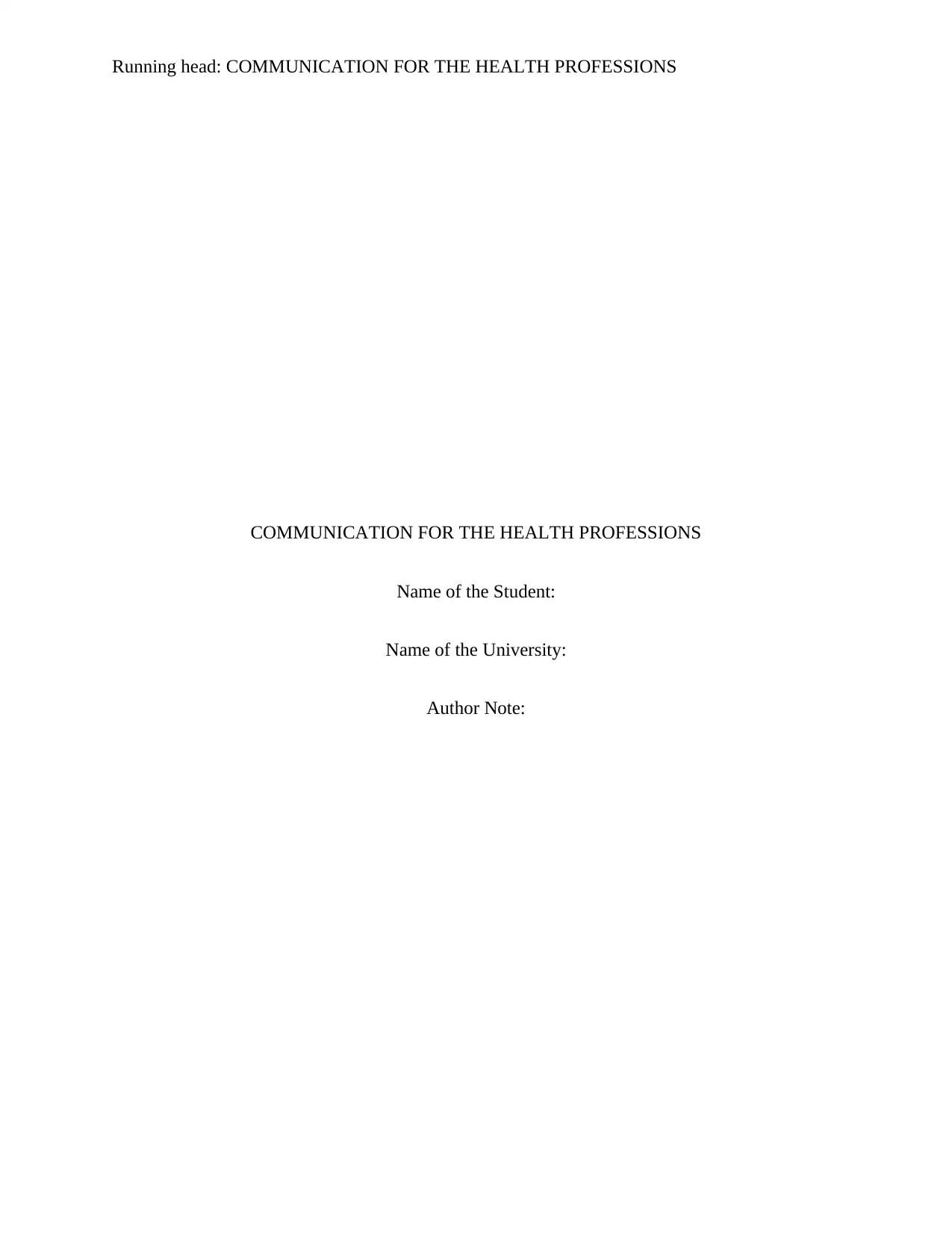
Running head: COMMUNICATION FOR THE HEALTH PROFESSIONS
COMMUNICATION FOR THE HEALTH PROFESSIONS
Name of the Student:
Name of the University:
Author Note:
COMMUNICATION FOR THE HEALTH PROFESSIONS
Name of the Student:
Name of the University:
Author Note:
Paraphrase This Document
Need a fresh take? Get an instant paraphrase of this document with our AI Paraphraser
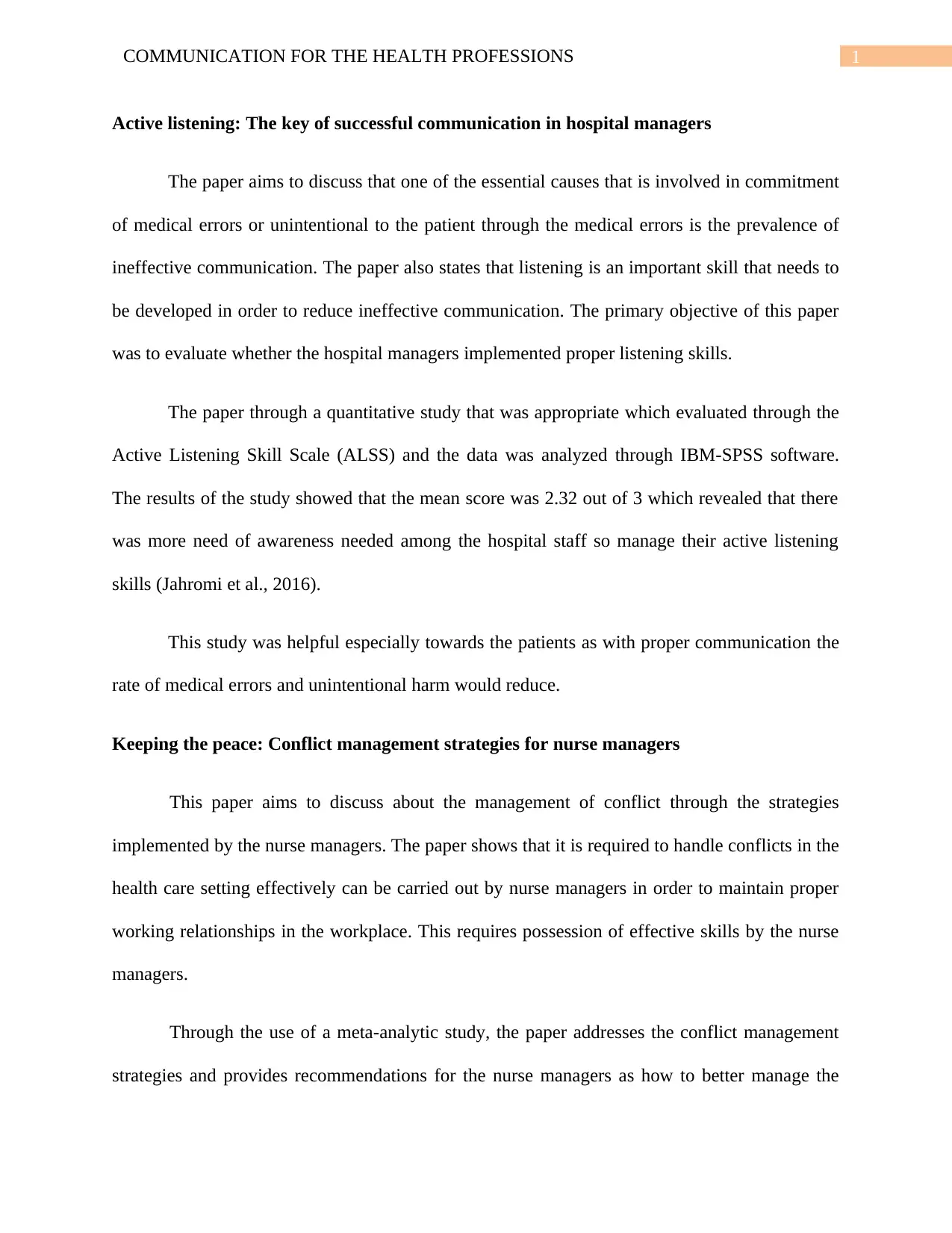
1COMMUNICATION FOR THE HEALTH PROFESSIONS
Active listening: The key of successful communication in hospital managers
The paper aims to discuss that one of the essential causes that is involved in commitment
of medical errors or unintentional to the patient through the medical errors is the prevalence of
ineffective communication. The paper also states that listening is an important skill that needs to
be developed in order to reduce ineffective communication. The primary objective of this paper
was to evaluate whether the hospital managers implemented proper listening skills.
The paper through a quantitative study that was appropriate which evaluated through the
Active Listening Skill Scale (ALSS) and the data was analyzed through IBM-SPSS software.
The results of the study showed that the mean score was 2.32 out of 3 which revealed that there
was more need of awareness needed among the hospital staff so manage their active listening
skills (Jahromi et al., 2016).
This study was helpful especially towards the patients as with proper communication the
rate of medical errors and unintentional harm would reduce.
Keeping the peace: Conflict management strategies for nurse managers
This paper aims to discuss about the management of conflict through the strategies
implemented by the nurse managers. The paper shows that it is required to handle conflicts in the
health care setting effectively can be carried out by nurse managers in order to maintain proper
working relationships in the workplace. This requires possession of effective skills by the nurse
managers.
Through the use of a meta-analytic study, the paper addresses the conflict management
strategies and provides recommendations for the nurse managers as how to better manage the
Active listening: The key of successful communication in hospital managers
The paper aims to discuss that one of the essential causes that is involved in commitment
of medical errors or unintentional to the patient through the medical errors is the prevalence of
ineffective communication. The paper also states that listening is an important skill that needs to
be developed in order to reduce ineffective communication. The primary objective of this paper
was to evaluate whether the hospital managers implemented proper listening skills.
The paper through a quantitative study that was appropriate which evaluated through the
Active Listening Skill Scale (ALSS) and the data was analyzed through IBM-SPSS software.
The results of the study showed that the mean score was 2.32 out of 3 which revealed that there
was more need of awareness needed among the hospital staff so manage their active listening
skills (Jahromi et al., 2016).
This study was helpful especially towards the patients as with proper communication the
rate of medical errors and unintentional harm would reduce.
Keeping the peace: Conflict management strategies for nurse managers
This paper aims to discuss about the management of conflict through the strategies
implemented by the nurse managers. The paper shows that it is required to handle conflicts in the
health care setting effectively can be carried out by nurse managers in order to maintain proper
working relationships in the workplace. This requires possession of effective skills by the nurse
managers.
Through the use of a meta-analytic study, the paper addresses the conflict management
strategies and provides recommendations for the nurse managers as how to better manage the
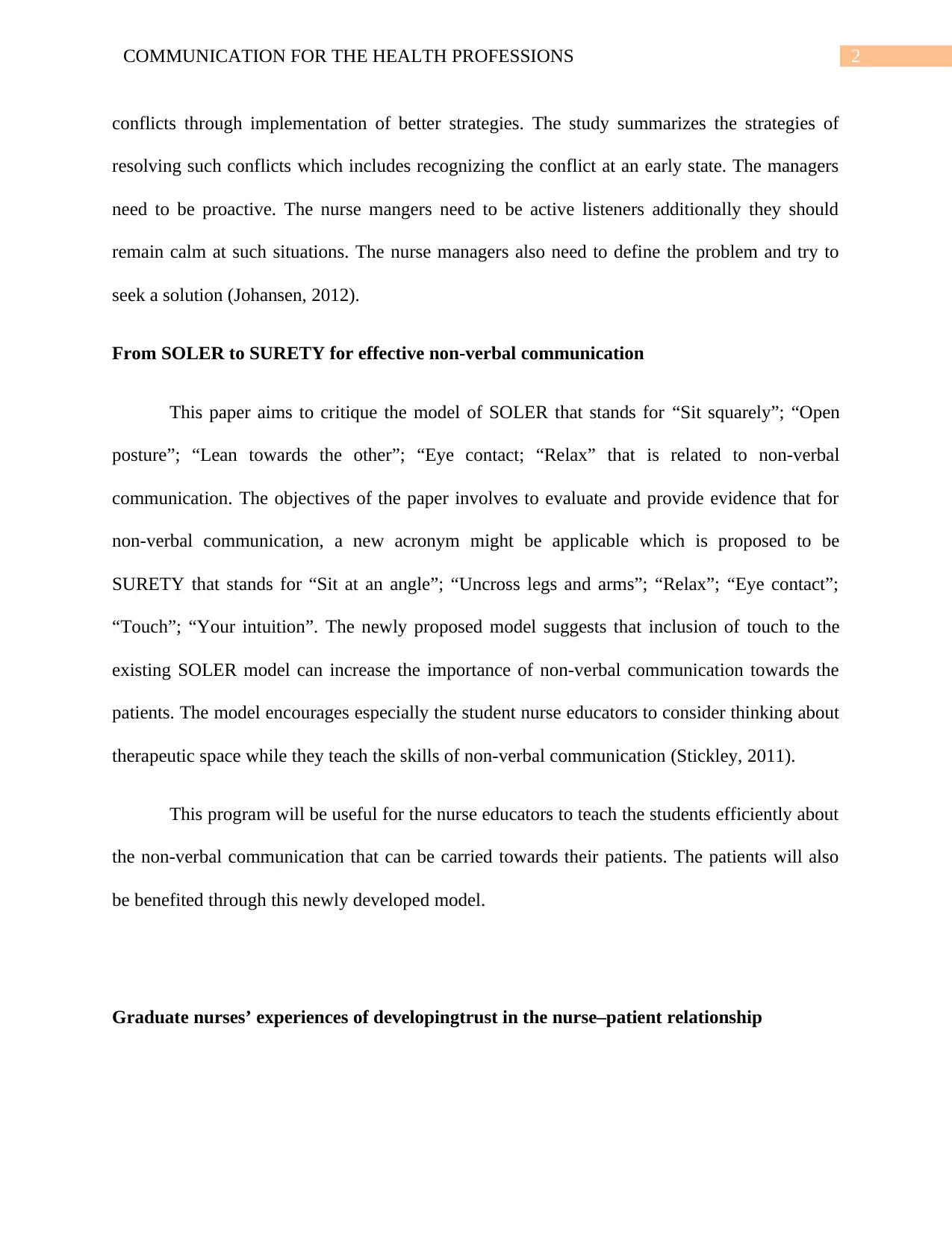
2COMMUNICATION FOR THE HEALTH PROFESSIONS
conflicts through implementation of better strategies. The study summarizes the strategies of
resolving such conflicts which includes recognizing the conflict at an early state. The managers
need to be proactive. The nurse mangers need to be active listeners additionally they should
remain calm at such situations. The nurse managers also need to define the problem and try to
seek a solution (Johansen, 2012).
From SOLER to SURETY for effective non-verbal communication
This paper aims to critique the model of SOLER that stands for “Sit squarely”; “Open
posture”; “Lean towards the other”; “Eye contact; “Relax” that is related to non-verbal
communication. The objectives of the paper involves to evaluate and provide evidence that for
non-verbal communication, a new acronym might be applicable which is proposed to be
SURETY that stands for “Sit at an angle”; “Uncross legs and arms”; “Relax”; “Eye contact”;
“Touch”; “Your intuition”. The newly proposed model suggests that inclusion of touch to the
existing SOLER model can increase the importance of non-verbal communication towards the
patients. The model encourages especially the student nurse educators to consider thinking about
therapeutic space while they teach the skills of non-verbal communication (Stickley, 2011).
This program will be useful for the nurse educators to teach the students efficiently about
the non-verbal communication that can be carried towards their patients. The patients will also
be benefited through this newly developed model.
Graduate nurses’ experiences of developingtrust in the nurse–patient relationship
conflicts through implementation of better strategies. The study summarizes the strategies of
resolving such conflicts which includes recognizing the conflict at an early state. The managers
need to be proactive. The nurse mangers need to be active listeners additionally they should
remain calm at such situations. The nurse managers also need to define the problem and try to
seek a solution (Johansen, 2012).
From SOLER to SURETY for effective non-verbal communication
This paper aims to critique the model of SOLER that stands for “Sit squarely”; “Open
posture”; “Lean towards the other”; “Eye contact; “Relax” that is related to non-verbal
communication. The objectives of the paper involves to evaluate and provide evidence that for
non-verbal communication, a new acronym might be applicable which is proposed to be
SURETY that stands for “Sit at an angle”; “Uncross legs and arms”; “Relax”; “Eye contact”;
“Touch”; “Your intuition”. The newly proposed model suggests that inclusion of touch to the
existing SOLER model can increase the importance of non-verbal communication towards the
patients. The model encourages especially the student nurse educators to consider thinking about
therapeutic space while they teach the skills of non-verbal communication (Stickley, 2011).
This program will be useful for the nurse educators to teach the students efficiently about
the non-verbal communication that can be carried towards their patients. The patients will also
be benefited through this newly developed model.
Graduate nurses’ experiences of developingtrust in the nurse–patient relationship
⊘ This is a preview!⊘
Do you want full access?
Subscribe today to unlock all pages.

Trusted by 1+ million students worldwide
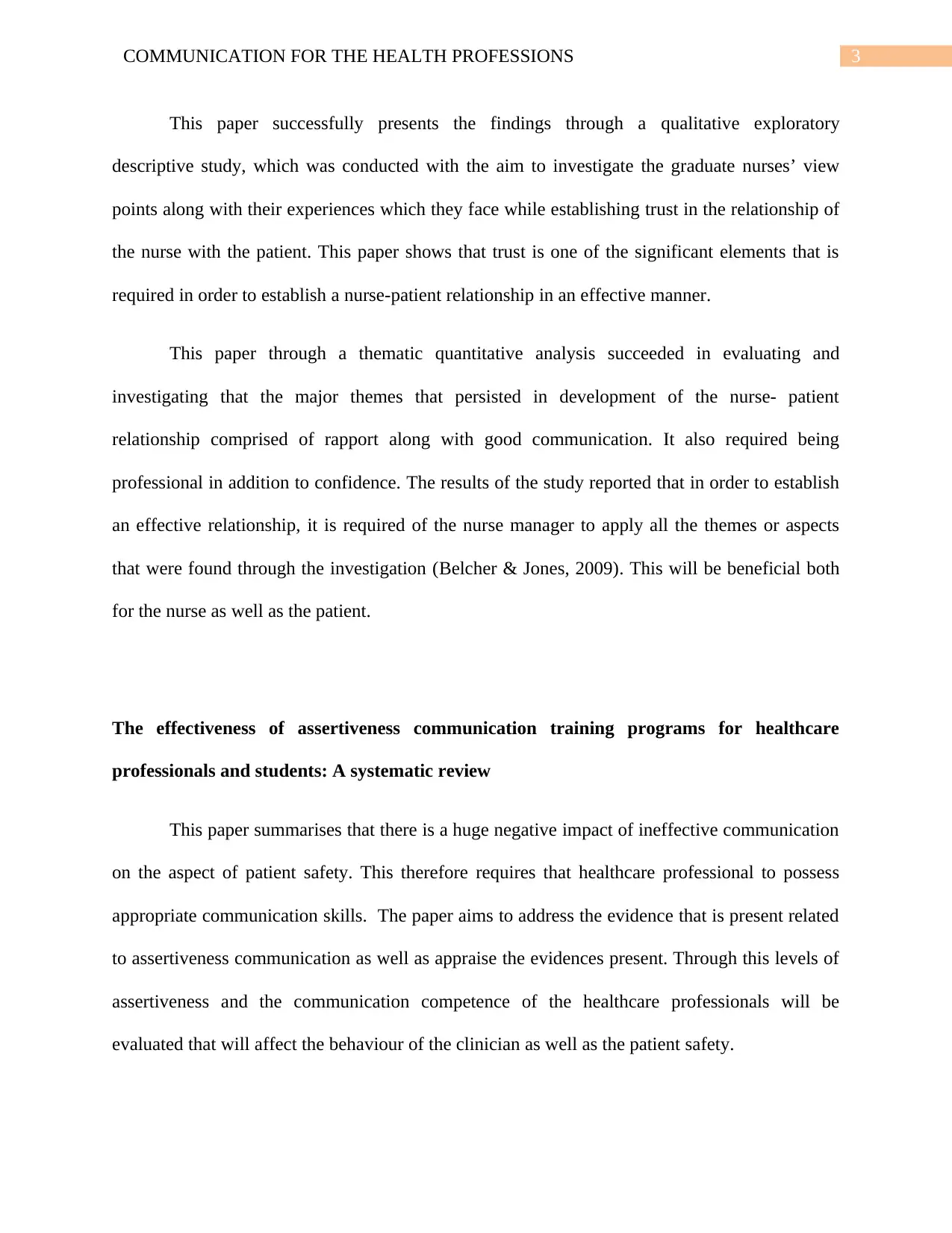
3COMMUNICATION FOR THE HEALTH PROFESSIONS
This paper successfully presents the findings through a qualitative exploratory
descriptive study, which was conducted with the aim to investigate the graduate nurses’ view
points along with their experiences which they face while establishing trust in the relationship of
the nurse with the patient. This paper shows that trust is one of the significant elements that is
required in order to establish a nurse-patient relationship in an effective manner.
This paper through a thematic quantitative analysis succeeded in evaluating and
investigating that the major themes that persisted in development of the nurse- patient
relationship comprised of rapport along with good communication. It also required being
professional in addition to confidence. The results of the study reported that in order to establish
an effective relationship, it is required of the nurse manager to apply all the themes or aspects
that were found through the investigation (Belcher & Jones, 2009). This will be beneficial both
for the nurse as well as the patient.
The effectiveness of assertiveness communication training programs for healthcare
professionals and students: A systematic review
This paper summarises that there is a huge negative impact of ineffective communication
on the aspect of patient safety. This therefore requires that healthcare professional to possess
appropriate communication skills. The paper aims to address the evidence that is present related
to assertiveness communication as well as appraise the evidences present. Through this levels of
assertiveness and the communication competence of the healthcare professionals will be
evaluated that will affect the behaviour of the clinician as well as the patient safety.
This paper successfully presents the findings through a qualitative exploratory
descriptive study, which was conducted with the aim to investigate the graduate nurses’ view
points along with their experiences which they face while establishing trust in the relationship of
the nurse with the patient. This paper shows that trust is one of the significant elements that is
required in order to establish a nurse-patient relationship in an effective manner.
This paper through a thematic quantitative analysis succeeded in evaluating and
investigating that the major themes that persisted in development of the nurse- patient
relationship comprised of rapport along with good communication. It also required being
professional in addition to confidence. The results of the study reported that in order to establish
an effective relationship, it is required of the nurse manager to apply all the themes or aspects
that were found through the investigation (Belcher & Jones, 2009). This will be beneficial both
for the nurse as well as the patient.
The effectiveness of assertiveness communication training programs for healthcare
professionals and students: A systematic review
This paper summarises that there is a huge negative impact of ineffective communication
on the aspect of patient safety. This therefore requires that healthcare professional to possess
appropriate communication skills. The paper aims to address the evidence that is present related
to assertiveness communication as well as appraise the evidences present. Through this levels of
assertiveness and the communication competence of the healthcare professionals will be
evaluated that will affect the behaviour of the clinician as well as the patient safety.
Paraphrase This Document
Need a fresh take? Get an instant paraphrase of this document with our AI Paraphraser
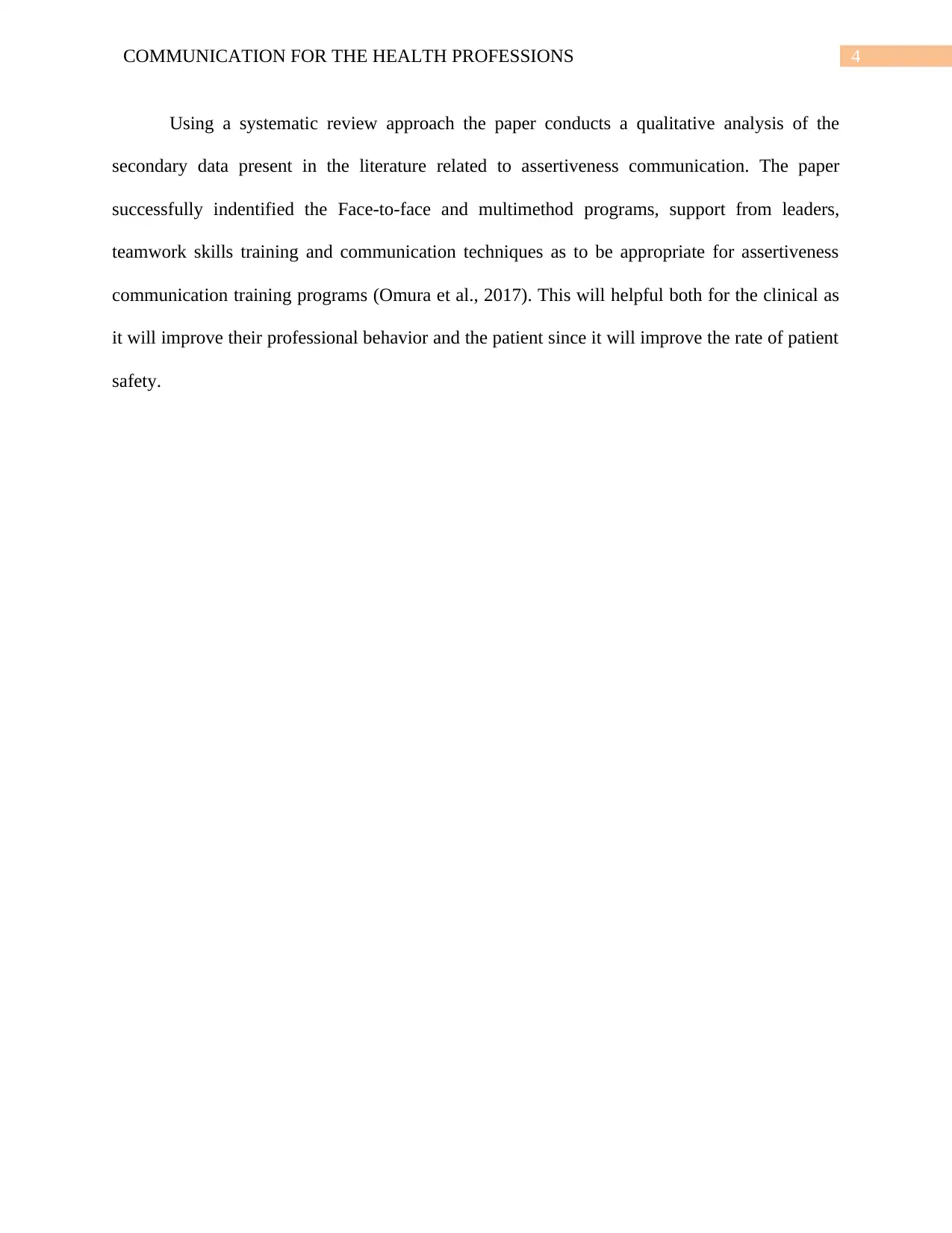
4COMMUNICATION FOR THE HEALTH PROFESSIONS
Using a systematic review approach the paper conducts a qualitative analysis of the
secondary data present in the literature related to assertiveness communication. The paper
successfully indentified the Face-to-face and multimethod programs, support from leaders,
teamwork skills training and communication techniques as to be appropriate for assertiveness
communication training programs (Omura et al., 2017). This will helpful both for the clinical as
it will improve their professional behavior and the patient since it will improve the rate of patient
safety.
Using a systematic review approach the paper conducts a qualitative analysis of the
secondary data present in the literature related to assertiveness communication. The paper
successfully indentified the Face-to-face and multimethod programs, support from leaders,
teamwork skills training and communication techniques as to be appropriate for assertiveness
communication training programs (Omura et al., 2017). This will helpful both for the clinical as
it will improve their professional behavior and the patient since it will improve the rate of patient
safety.
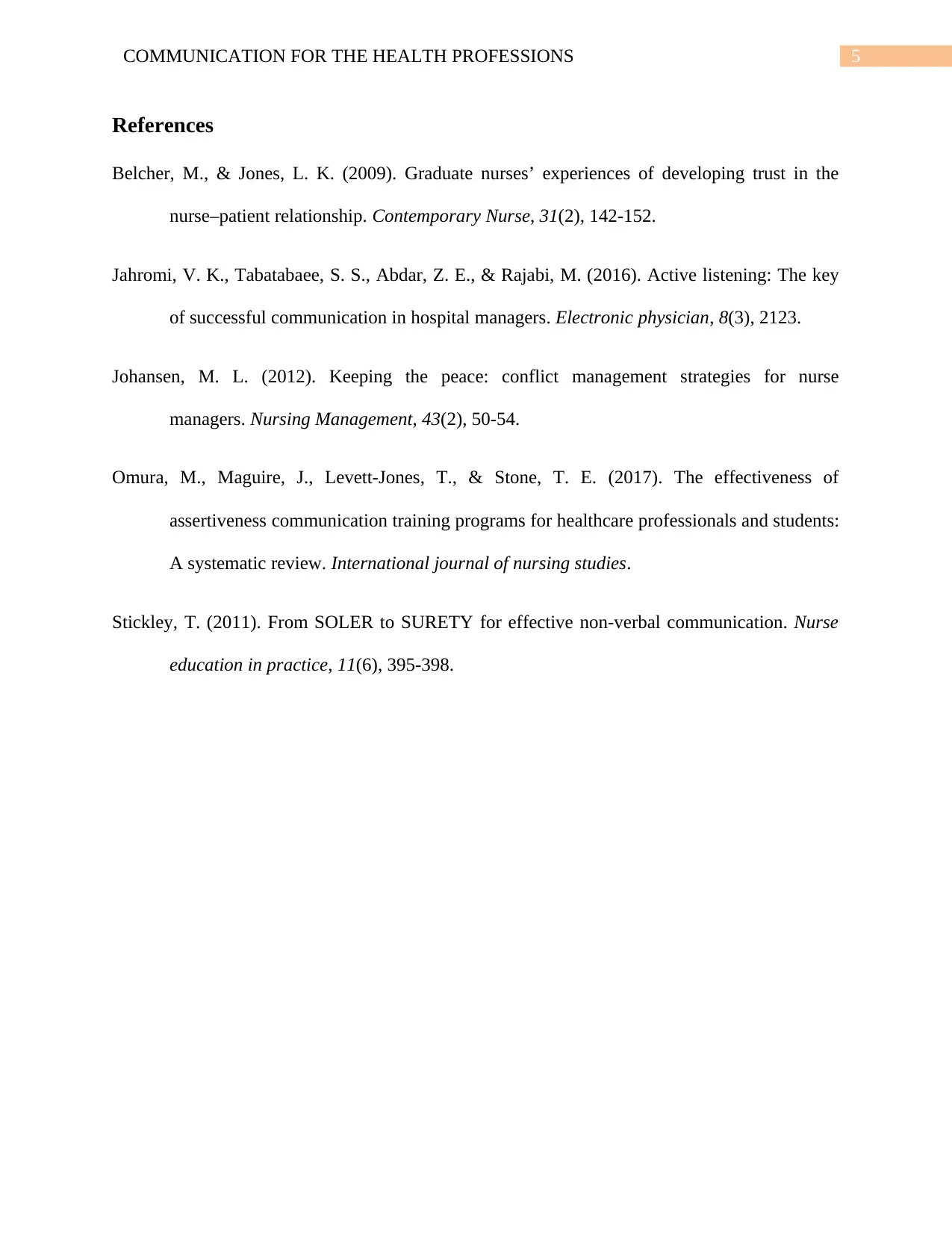
5COMMUNICATION FOR THE HEALTH PROFESSIONS
References
Belcher, M., & Jones, L. K. (2009). Graduate nurses’ experiences of developing trust in the
nurse–patient relationship. Contemporary Nurse, 31(2), 142-152.
Jahromi, V. K., Tabatabaee, S. S., Abdar, Z. E., & Rajabi, M. (2016). Active listening: The key
of successful communication in hospital managers. Electronic physician, 8(3), 2123.
Johansen, M. L. (2012). Keeping the peace: conflict management strategies for nurse
managers. Nursing Management, 43(2), 50-54.
Omura, M., Maguire, J., Levett-Jones, T., & Stone, T. E. (2017). The effectiveness of
assertiveness communication training programs for healthcare professionals and students:
A systematic review. International journal of nursing studies.
Stickley, T. (2011). From SOLER to SURETY for effective non-verbal communication. Nurse
education in practice, 11(6), 395-398.
References
Belcher, M., & Jones, L. K. (2009). Graduate nurses’ experiences of developing trust in the
nurse–patient relationship. Contemporary Nurse, 31(2), 142-152.
Jahromi, V. K., Tabatabaee, S. S., Abdar, Z. E., & Rajabi, M. (2016). Active listening: The key
of successful communication in hospital managers. Electronic physician, 8(3), 2123.
Johansen, M. L. (2012). Keeping the peace: conflict management strategies for nurse
managers. Nursing Management, 43(2), 50-54.
Omura, M., Maguire, J., Levett-Jones, T., & Stone, T. E. (2017). The effectiveness of
assertiveness communication training programs for healthcare professionals and students:
A systematic review. International journal of nursing studies.
Stickley, T. (2011). From SOLER to SURETY for effective non-verbal communication. Nurse
education in practice, 11(6), 395-398.
⊘ This is a preview!⊘
Do you want full access?
Subscribe today to unlock all pages.

Trusted by 1+ million students worldwide
1 out of 6
Related Documents
Your All-in-One AI-Powered Toolkit for Academic Success.
+13062052269
info@desklib.com
Available 24*7 on WhatsApp / Email
![[object Object]](/_next/static/media/star-bottom.7253800d.svg)
Unlock your academic potential
Copyright © 2020–2026 A2Z Services. All Rights Reserved. Developed and managed by ZUCOL.




